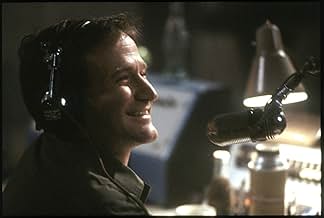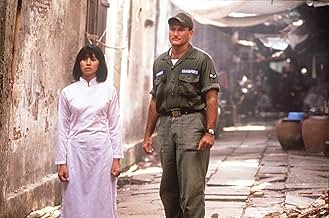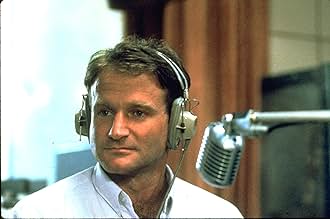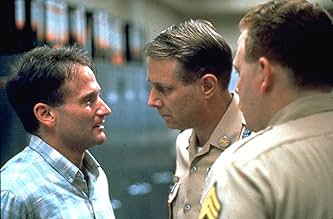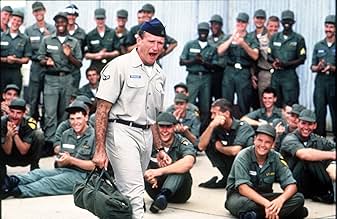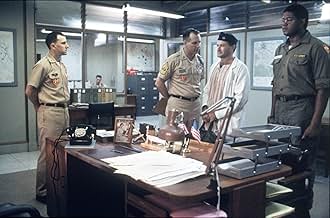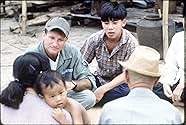Good Morning, Vietnam
- 1987
- Tous publics
- 2h 1min
Un nouveau disc jockey est envoyé au Vietnam pour animer la radio des forces armées et distraire les soldats. Son ton frais et irrévérencieux le rend vite populaire auprès des militaires.Un nouveau disc jockey est envoyé au Vietnam pour animer la radio des forces armées et distraire les soldats. Son ton frais et irrévérencieux le rend vite populaire auprès des militaires.Un nouveau disc jockey est envoyé au Vietnam pour animer la radio des forces armées et distraire les soldats. Son ton frais et irrévérencieux le rend vite populaire auprès des militaires.
- Réalisation
- Scénario
- Casting principal
- Nommé pour 1 Oscar
- 7 victoires et 4 nominations au total
Tom T. Tran
- Tuan
- (as Tung Thanh Tran)
Dan Stanton
- Censor #1
- (as Dan R. Stanton)
Don Stanton
- Censor #2
- (as Don E. Stanton)
John Marshall Jones
- MP #2
- (as J.J.)
Avis à la une
Vietnam without a doubt was a dark period in our history.Any comedy film surrounding Vietnam would indeed have to be done delicately.This movie pulls it off.What amazes me most about the film is the flawless, improvisational radio dialog from Robin Williams.This,as most of you may know,was completely unscripted to allow Williams an opportunity to work his magic.Also,it had to be timely,for the movie is,of course,set in 1965.The fact that he was able to do this is nothing short of amazing.The supporting cast was also incredible,with great performances by Forrest Whitaker,Bruno Kirby,and the late J.T.Walsh as "Sergeant Major Dickerson",the man you love to hate.Although some of the horror that was Vietnam is here,it's only giving you a taste of it,as it concentrates more on the Williams character's quest to make our beloved soldiers forget their horror,at least for a while.Highly recommended.
Made at a time when films on the Vietnam war were being produced by America at a healthy rate, Good Morning, Vietnam comes across as the sort that falls into both 'types' that were being produced at the time. Platoon got under the skin of Vietnam, telling the events from an individual's perspective through voiceovers without relying on a lot of causality, rather the everyday tasks and events that occur. Full Metal Jacket was an interesting beast in the sense most of its more intense scenes didn't actually happen in Vietnam but rather at home on the training ground. But both were in a sensible tradition and took attention away from the Reaganism inspired 'action' films that were Rambo: First Blood Part II and the like.
Good Morning, Vietnam falls into both these sorts of Vietnam war films. On one hand it is a serious film about the war and deals with serious issues such as morale and how dangerous conflict with the enemy actually is without doing what Rambo did by turning the war genre into a sub-division of the action genre. At one point in the film, DJ and lead character of the film Adrian Cronauer (Williams) finds himself in a hostile area out in the jungle and you do feel the shift in atmosphere the film briefly moves into in the sense this guy is not a soldier but he is in a dangerous position and he isn't equipped with how to get through it. There is another scene in which a street side bomb goes off and Adrian is caught up in the middle of it, further reminding us of the war zone and cleverly shifting the aura.
But the film does fall into the genre of comedy and while it does so, it never distracts us from the fact this is taking place during a war unlike First Blood: Part II which could really have been an action film set amongst any backdrop. Good Morning, Vietnam does not ignore its comedy roots either and gives us genuinely entertaining disc jockey rants from Williams who shines with his animation and ad-libbing, further reminding us of a later film of his, Aladdin, and how he really was the star of that piece.
The best parts of Good Morning, Vietnam actually raise issues to do with oppositional reading. As a character, Adrian is one of those charismatic individuals who is perhaps more focused on entertaining his audience first but when repercussions to do with that want to entertain arise, it is an oppositional reading to something that seems innocent enough. There are a couple of scenes and incidences that deal with this theme of oppositional reading. One that springs to mind takes place in a bar in which Adrian has brought a Vietnamese friend whom he teaches in an English class. The trouble is, it's a G.I. bar and certain soldiers have an issue with the Vietnamese person being there. It is Adrian's carefree and relaxed attitude to letting the individual come with him to the bar that has upset certain others around him, resulting in an oppositional opinion on whether the Vietnamese person should be allowed there. One says he can, others say he can't and conflict erupts.
This battle is constantly going on within the boundaries of the radio studio and exists between Adrian and the censors who blank out all the bad news such as deaths and bombings, failing to deliver the real news, and instead keep morale from going below a certain point. Adrian's style of giving the people what they should hear in a charismatic style also rubs off spawning a sub-story revolving around a small school that teaches Vietnamese people the English language. Before hand, they were learning very basic words and phrases but after Adrian takes over, New York City slang or 'jargon' is the name of the game and while you wouldn't find English as a foreign language classes doing this sort of thing, Adrian brings his charismatic style to a class, turning it from formal to informal.
The theme here is that he's giving them exactly what he feels they need to know, not what the curriculum demand they know. It is the same with the radio station and the news censorship; giving people what they have a right to know vs. what a higher power say they should know. The principal foil for Adrian is Lt. Steven Hauk (Kirby) who is against Adrian's style of parody and constant joking but when he is put on air, the best he can do is adopt the voice and role of a Frenchman as he mocks and plods his way through airtime. It is a battle that the oppositional readers loose since morale falls drastically after Adrian is taken off and he is forced to be reinstated because of this.
Good Morning, Vietnam carries a pumping soundtrack which is what you'd expect for a film about a DJ and an emphasis on radio and its constant referencing to popular culture, gliding from The Wizard of Oz to Eleanor Roosevelt makes Williams' scenes consistently fun to watch. But other than this, it gives some political stances without ever feeling forced with the 'Wonderful World' montage over wartime action and juxtaposes James Brown's music over other scenes of wartime action. The film is a success in comedy and drama, a rarity of sorts given Dr. Strangelove supposedly set the standards.
Good Morning, Vietnam falls into both these sorts of Vietnam war films. On one hand it is a serious film about the war and deals with serious issues such as morale and how dangerous conflict with the enemy actually is without doing what Rambo did by turning the war genre into a sub-division of the action genre. At one point in the film, DJ and lead character of the film Adrian Cronauer (Williams) finds himself in a hostile area out in the jungle and you do feel the shift in atmosphere the film briefly moves into in the sense this guy is not a soldier but he is in a dangerous position and he isn't equipped with how to get through it. There is another scene in which a street side bomb goes off and Adrian is caught up in the middle of it, further reminding us of the war zone and cleverly shifting the aura.
But the film does fall into the genre of comedy and while it does so, it never distracts us from the fact this is taking place during a war unlike First Blood: Part II which could really have been an action film set amongst any backdrop. Good Morning, Vietnam does not ignore its comedy roots either and gives us genuinely entertaining disc jockey rants from Williams who shines with his animation and ad-libbing, further reminding us of a later film of his, Aladdin, and how he really was the star of that piece.
The best parts of Good Morning, Vietnam actually raise issues to do with oppositional reading. As a character, Adrian is one of those charismatic individuals who is perhaps more focused on entertaining his audience first but when repercussions to do with that want to entertain arise, it is an oppositional reading to something that seems innocent enough. There are a couple of scenes and incidences that deal with this theme of oppositional reading. One that springs to mind takes place in a bar in which Adrian has brought a Vietnamese friend whom he teaches in an English class. The trouble is, it's a G.I. bar and certain soldiers have an issue with the Vietnamese person being there. It is Adrian's carefree and relaxed attitude to letting the individual come with him to the bar that has upset certain others around him, resulting in an oppositional opinion on whether the Vietnamese person should be allowed there. One says he can, others say he can't and conflict erupts.
This battle is constantly going on within the boundaries of the radio studio and exists between Adrian and the censors who blank out all the bad news such as deaths and bombings, failing to deliver the real news, and instead keep morale from going below a certain point. Adrian's style of giving the people what they should hear in a charismatic style also rubs off spawning a sub-story revolving around a small school that teaches Vietnamese people the English language. Before hand, they were learning very basic words and phrases but after Adrian takes over, New York City slang or 'jargon' is the name of the game and while you wouldn't find English as a foreign language classes doing this sort of thing, Adrian brings his charismatic style to a class, turning it from formal to informal.
The theme here is that he's giving them exactly what he feels they need to know, not what the curriculum demand they know. It is the same with the radio station and the news censorship; giving people what they have a right to know vs. what a higher power say they should know. The principal foil for Adrian is Lt. Steven Hauk (Kirby) who is against Adrian's style of parody and constant joking but when he is put on air, the best he can do is adopt the voice and role of a Frenchman as he mocks and plods his way through airtime. It is a battle that the oppositional readers loose since morale falls drastically after Adrian is taken off and he is forced to be reinstated because of this.
Good Morning, Vietnam carries a pumping soundtrack which is what you'd expect for a film about a DJ and an emphasis on radio and its constant referencing to popular culture, gliding from The Wizard of Oz to Eleanor Roosevelt makes Williams' scenes consistently fun to watch. But other than this, it gives some political stances without ever feeling forced with the 'Wonderful World' montage over wartime action and juxtaposes James Brown's music over other scenes of wartime action. The film is a success in comedy and drama, a rarity of sorts given Dr. Strangelove supposedly set the standards.
Good Morning, Vietnam (1987)
A lighthearted but deadly serious anti-war film, actually. This is of course a Robin Williams movie so that it is his schtick, brilliant and inspired, that makes it soar. The best of it, including the famous riff when he first gets on the air as the new Saigon DJ, is hilarious and breathtaking. There is a plot, sort of, as he goes through a rise and fall at the military radio station, but it's more about his shining moments behind the microphone than anything else.
The "else" in this movie is, however, most of the movie. That is, Williams has a serious role as an offbeat renegade in a chaotic world surrounded by a range of sensible and very insensible officers and colleagues. At the most extreme, when we see a Vietnamese village firebombed while Louis Armstrong sings "It's a Wonderful World," the sentiment is so cloying it makes you cry, and you're not sure why because you know it's just over the top manipulation. Likewise when Williams is caught in a traffic jam with other military vehicles and he warms up the soldiers by humanizing everyone and making them feel like they really should be back home. Which they should be, as we know in retrospect.
So the movie has another side that's kind of sentimental and simplistic, whatever its good pacifist intentions. Williams is a decent actor—I'm not one of those who thinks he's brilliant outside of his funny roles—and so it holds up pretty well. But the plot line keeps the movie from really finding pathos, or comedy, or warmth, or tragedy of a dramatic kind, in the scenes outside the radio station. And I think that's what it intended.
For those who don't know, it's worth adding that the main character, Adrian Cronauer, was a real person, and still is—he's a staunch Republican (Williams was not, to be sure) and an innovator in radio in Vietnam. He also co-wrote the screenplay, I assume working on the scenes that he would know best rather than the larger saccharine plot aspects. A great story, and the real Cronauer deserves credit for inspiring it, and helping it along. He was, along with most of us, "Godsmacked" when he heard the news of Williams's death.
A lighthearted but deadly serious anti-war film, actually. This is of course a Robin Williams movie so that it is his schtick, brilliant and inspired, that makes it soar. The best of it, including the famous riff when he first gets on the air as the new Saigon DJ, is hilarious and breathtaking. There is a plot, sort of, as he goes through a rise and fall at the military radio station, but it's more about his shining moments behind the microphone than anything else.
The "else" in this movie is, however, most of the movie. That is, Williams has a serious role as an offbeat renegade in a chaotic world surrounded by a range of sensible and very insensible officers and colleagues. At the most extreme, when we see a Vietnamese village firebombed while Louis Armstrong sings "It's a Wonderful World," the sentiment is so cloying it makes you cry, and you're not sure why because you know it's just over the top manipulation. Likewise when Williams is caught in a traffic jam with other military vehicles and he warms up the soldiers by humanizing everyone and making them feel like they really should be back home. Which they should be, as we know in retrospect.
So the movie has another side that's kind of sentimental and simplistic, whatever its good pacifist intentions. Williams is a decent actor—I'm not one of those who thinks he's brilliant outside of his funny roles—and so it holds up pretty well. But the plot line keeps the movie from really finding pathos, or comedy, or warmth, or tragedy of a dramatic kind, in the scenes outside the radio station. And I think that's what it intended.
For those who don't know, it's worth adding that the main character, Adrian Cronauer, was a real person, and still is—he's a staunch Republican (Williams was not, to be sure) and an innovator in radio in Vietnam. He also co-wrote the screenplay, I assume working on the scenes that he would know best rather than the larger saccharine plot aspects. A great story, and the real Cronauer deserves credit for inspiring it, and helping it along. He was, along with most of us, "Godsmacked" when he heard the news of Williams's death.
I just sat through a DVD of this movie,the second(?)time I'd seen this film. The last time I could recall seeing this,it was on pay-per-view television in a hotel(the Red Lion I think it was) room,August of 1988,so my memories of this film could use a refreshing. I'm glad I got refreshed.
In 1965,Airman Adrian Cronauer(Robin Williams,in the first of his four Academy Award nominations)is brought on to do an Armed Forces Radio stint in Vietnam. Behind the microphone,Cronauer lets loose,much to the surprise and delight of many of the troops and servicemen around the area of combat. His combination of off-the-wall humor,impressions,sound gags and quick wit,mixed with his love of free-wheeling Rock music of the era,is pretty much welcomed in the area,save for a few angry sorts: a Napoleon-complexed intermediate CO named Hauk(Bruno Kirby,unrecognizable but for the voice) and a stiff-lipped,quietly vindictive middle commander named Dickerson(J.T.Walsh,so good here it would seem like this typecast him). As this is going on,Cronauer becomes smitten with a local girl(Chinatra Sukapatra,spelling?)and befriends her brother(Tung Thanh Tran),which leads the popular DJ down a road of self-discovery.
With excellent support from Forrest Whitaker(one of my favorites!he ends up sort of counter-balancing Williams' manic frenzy with nerdish normalcy as his buddy/assistant/guide),Richard Edson,Noble Winnigham,Robert Wuhl and Cu Ba Nguyen(as the oily GI bar proprietor)among others,this film,directed by Barry Levinson(whose work hasn't been this good in what feels like forever,certainly not since Avalon or Rain Man) and written by Mitch Markowitz,it is arguable one of the deftest films to create and maintain a balance between the horrors and inhumanity of war and the humor and pathos that are very much present in it. Robin Williams' fans may get much more out of this that those who aren't,but I think even many of those who don't consider themselves fanciers of his talents should be able to appreciate this. The images were powerful enough that they stuck with me some after the first time I saw GMV and after a second time I feel like can appreciate even more out of this movie.
In 1965,Airman Adrian Cronauer(Robin Williams,in the first of his four Academy Award nominations)is brought on to do an Armed Forces Radio stint in Vietnam. Behind the microphone,Cronauer lets loose,much to the surprise and delight of many of the troops and servicemen around the area of combat. His combination of off-the-wall humor,impressions,sound gags and quick wit,mixed with his love of free-wheeling Rock music of the era,is pretty much welcomed in the area,save for a few angry sorts: a Napoleon-complexed intermediate CO named Hauk(Bruno Kirby,unrecognizable but for the voice) and a stiff-lipped,quietly vindictive middle commander named Dickerson(J.T.Walsh,so good here it would seem like this typecast him). As this is going on,Cronauer becomes smitten with a local girl(Chinatra Sukapatra,spelling?)and befriends her brother(Tung Thanh Tran),which leads the popular DJ down a road of self-discovery.
With excellent support from Forrest Whitaker(one of my favorites!he ends up sort of counter-balancing Williams' manic frenzy with nerdish normalcy as his buddy/assistant/guide),Richard Edson,Noble Winnigham,Robert Wuhl and Cu Ba Nguyen(as the oily GI bar proprietor)among others,this film,directed by Barry Levinson(whose work hasn't been this good in what feels like forever,certainly not since Avalon or Rain Man) and written by Mitch Markowitz,it is arguable one of the deftest films to create and maintain a balance between the horrors and inhumanity of war and the humor and pathos that are very much present in it. Robin Williams' fans may get much more out of this that those who aren't,but I think even many of those who don't consider themselves fanciers of his talents should be able to appreciate this. The images were powerful enough that they stuck with me some after the first time I saw GMV and after a second time I feel like can appreciate even more out of this movie.
Robbin Williams gives the performance of his life, in this funny, yet politically motivated movie, on the no (official) news or miss-information given out (to the troops) at the time of the most controversial conflict of the modern era. A strong supporting cast, including a young Forrest Whitaker are a bonus but the overall story is a bit thin and the love interest (for me) is not fully developed.
Le saviez-vous
- AnecdotesRobin Williams ad-libbed all of Adrian Cronauer's broadcasts.
- GaffesJeeps used in the Vietnam war did not have ignition keys.
- Citations
Adrian Cronauer: [to Sergeant Major Dickerson] You are in more dire need of a blowjob than any white man in history.
- Versions alternativesThe Spanish-language dub of the film, during a scene involving Adrian's first meeting with Lt. Hawk, replaces the mentions of the names of such artists as Lawrence Welk, Jim Nabors, and Perry Como with those of Trini Lopez, Xavier Cugat, and Paul Anka.
- Bandes originalesAround The World
Written by Harold Adamson (as Adamsson) and Victor Young (as Young)
Performed by Lawrence Welk
Courtesy of The Welk Record Group
Meilleurs choix
Connectez-vous pour évaluer et suivre la liste de favoris afin de recevoir des recommandations personnalisées
Détails
Box-office
- Budget
- 13 000 000 $US (estimé)
- Montant brut aux États-Unis et au Canada
- 123 922 370 $US
- Week-end de sortie aux États-Unis et au Canada
- 194 308 $US
- 27 déc. 1987
- Montant brut mondial
- 123 923 306 $US
- Durée
- 2h 1min(121 min)
- Couleur
- Rapport de forme
- 1.85 : 1
Contribuer à cette page
Suggérer une modification ou ajouter du contenu manquant





